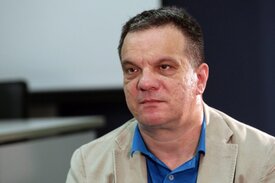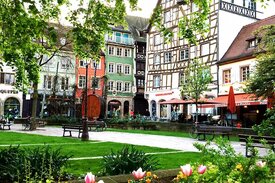Conference
Quarterly Media Meter
06. December 2017.
In the European Parliament, on Tuesday, December 5th, a debate on the media situation in Serbia and other Western Balkan countries took place, organized by the informal group "Friends of Serbia."
On that occasion, an analysis of the Quarterly Media Meter on the development of print media in Serbia was presented, after which debate participants had the opportunity to exchange views with the research and scientific-expert team of the Media Meter project and other media professionals.
Balance of topics, sources of information, polarization of views, and impact on the objective awareness of the public in Serbia were all topics presented to European parliamentarians by Serbian media researchers and experts Dejan Vuk Stanković and Velimir Ćurgus Kazimir.
"Sometimes we have this mistaken impression that there is no media freedom in Serbia. What is clear from this Media Meter analysis is that there are significant differences in media reports, both for and against, that there is too much negative information about everyone, both the opposition and the government," emphasized Franc Bogovič, a European parliamentarian and one of the organizers of this event. According to him, media outlets that follow the government or the opposition are sometimes too clearly defined.
Presenting the Quarterly Media Meter on the state of print media in Serbia, Professor Dejan Vuk Stanković stated that there is strong political polarization when it comes to daily newspapers.
According to him, weekly publications are fundamentally critical of the government, differing only in the degree of criticism and foreign policy orientation.
"In Serbia, we witness freedom in print media, but what its outcome is, is a significant polarization," concludes Professor Dejan Vuk Stanković.
The problem with the media in Serbia is not so much about media freedom as it is about professionalism, editorial policy, and attitudes toward certain topics, according to one of the authors of the Media Meter, Velimir Ćurgus Kazimir.
The debate on the media space in Serbia in the European Parliament was organized by the chairman and vice-chairman of the informal group "Friends of Serbia" in the European Parliament, Emilijan Pavel and Franc Bogovič.
The event was attended by the chairman of the EP Foreign Affairs Committee and EP rapporteur for Serbia, David McAllister, the coordinator of the Social Democrats in the Foreign Affairs Committee, Knut Fleckenstein, the Vice President of the European People's Party for the Western Balkans, Andrej Kovačev, the Vice President of the Social Democrats responsible for foreign policy, Victor Boštinaru, as well as MEPs Igor Šoltes, Andor Deli, Jozo Radoš, Georgios Epitideios, representatives of the European External Action Service, representatives of EU member states, and assistants to MEPs.


Strasbourg is a city located in the Alsace region of France, situated along the Rhine River, and it serves as an important port and industrial center. The city has a thriving trade in wine, hops, and tobacco. Strasbourg is known for its Gothic-style cathedral, university, conservatory, and academy. It is involved in various industrial sectors, including shipbuilding, metallurgy, machinery, food, textiles, tobacco, and printing. As of 2011, the population of the city was 272,222. Since January 1, 2016, Strasbourg has become the capital of the new administrative region of Alsace-Champagne-Ardenne-Lorraine.
Due to its bilingual and bicultural nature, the city has become one of the key capitals of a united Europe. It is home to the Council of Europe, the seat of the European Parliament, and the European Court of Human Rights.
European Parliament
Since July 7, 1981, the European Parliament has adopted numerous resolutions regarding its seat, urging member countries' governments to fulfill their commitment to establish a permanent seat for their institutions. During this time, the Parliament typically operated in several cities (Luxembourg, Strasbourg, Brussels). For the European Council sessions in Edinburgh on December 11-12, 1992, it was decided to establish the seats of institutions under the following conditions:
After the Legal Court approved this decision, it was incorporated into the Amsterdam Agreement in the form of a protocol. Sessions are held each year according to a schedule set by the Conference of Presidents. Since 2004, the Parliament has held eleven weekly sessions in Strasbourg and five in two days in Brussels.
Council of Europe
This international organization brings together 48 member countries, with its headquarters in Strasbourg. The following institutions are also located here:
Additionally, Strasbourg is home to various European institutions, including:
European Quarter:
The city features a European Quarter that is rapidly developing, thanks to new organizations and their administrations. A business center is being constructed in this area, connecting it to the rest of the city through public transportation.